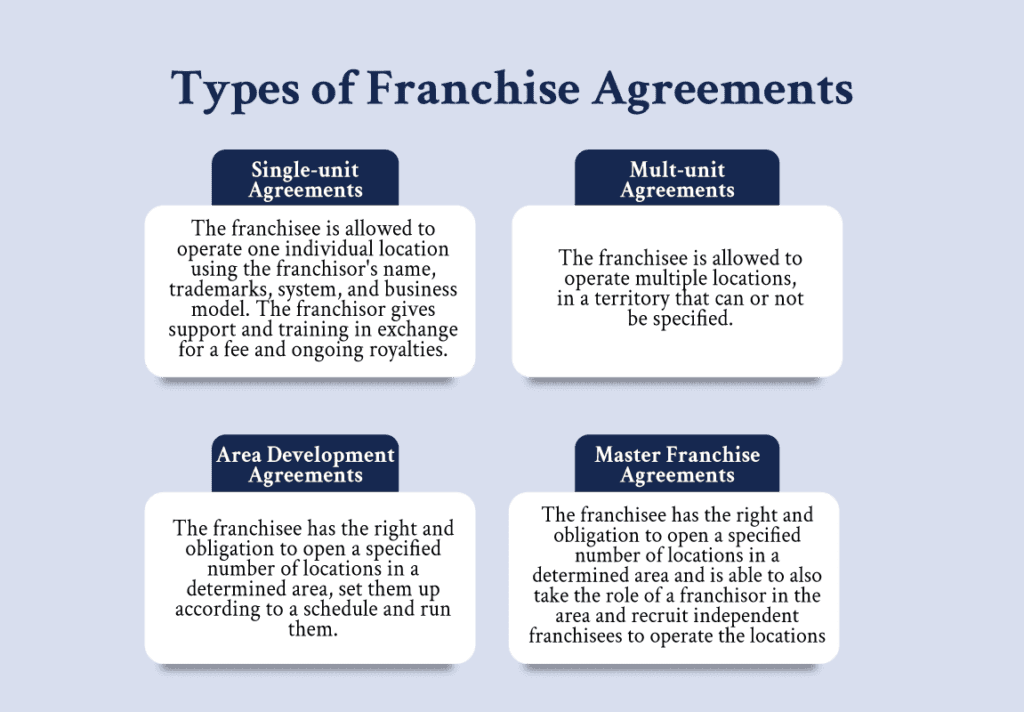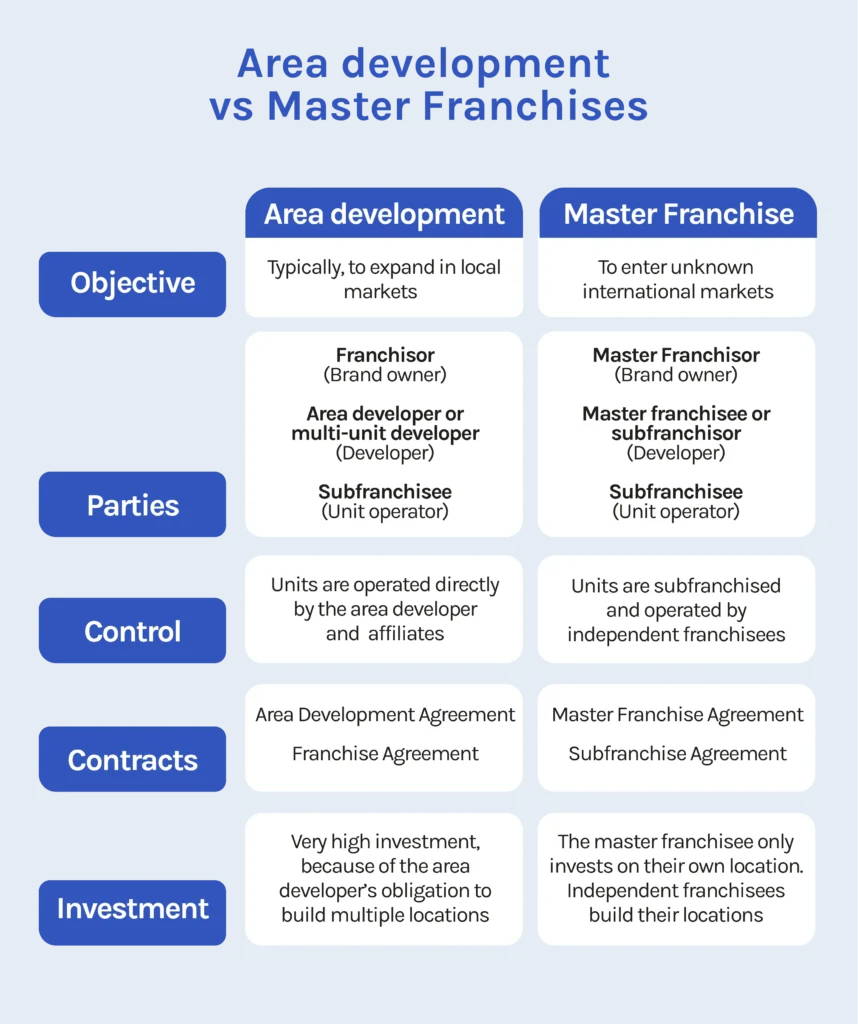The 4 types of franchise agreements

Franchise agreements can be divided into two main categories, single-unit and multi-unit franchise agreements. However, there are different variations of multi-unit franchise agreements in which the roles, responsibilities, and profit distribution differ.
Regardless of the complexity of the franchise agreement, it is of the utmost importance that you consult a franchise attorney before entering a deal, to ensure you are in a favorable position, your rights are protected, and that you understand your responsibilities as a franchisee.
In this article, we will show you the different types of franchise agreements and how each works.
1. Single-unit Franchise Agreement
Single-unit franchise agreements are the basic and most typical kinds of agreements, in which a company, called a franchisor, allows a third party, the franchisee, to operate a location using its trademarks, system, and business model to sell its products or services.
Party’s roles and responsibilities
FRANCHISOR
- Provide the franchisee with a proven business concept, intellectual property, systems, and business know-how.
- Train the franchisee and provide marketing and operational support to ensure the unit offers the required quality and consistency across the franchise network.
- Provide franchise disclosure document and franchise agreement
- Collect fees and royalties
FRANCHISEE
- Build the location and purchase or lease the required furniture, equipment, software, and other assets.
- Attend training and adhere to the franchisor’s standards and guidelines.
- Handle the day-to-day operations of the business and train employees.
- Pay the initial fee and other required costs, such as advertising and training fees, and cover ongoing royalties.
- Handle, if required, local marketing and promotion
ADVANTAGES
- Easier management: The franchisee can focus on one unit at a time and be able to analyze if it’s profitable to open more locations in the future at a lower risk.
- Lower initial investment: The costs of entering a single-unit agreement, although considerable, are less hefty than those of entering a multi-unit agreement.
- Controlled expansion: Through franchising, a company can easily open more locations and reduce the costs of setting up a new unit by allocating the costs and operating responsibilities to a third party.
dISADVANTAGES
- Limited growth potential: If the franchisee plans to open more locations, it may be more expensive and timely to rely on single-unit arrangements than on multi-unit agreements.
- Reliance on a single location: The revenue depends on the performance of one unit, which can vary according to local market conditions and competition.
TYPICALLY USED WHEN
These kinds of agreements are a feasible option when a company is looking to expand its operations and brand awareness and the interested franchisee does not have the financial capability or business experience to open more than one unit in the short term.
2. Multi-Unit franchise agreement
In a multi-unit franchise agreement, the franchisor grants the right to open and operate several agreed locations over a set period. This kind of agreement may or may not have territorial restrictions, and can have different variations, such as the following:

3. area Development Agreement
In an ADA, the franchisee has the right and obligation to open a specific number of locations in a defined territory within a set timeframe. The franchisee, also called an area developer, will have to pay a development fee, apart from the initial franchising fee, to be able to open more units eventually and have exclusivity rights in that territory.
Development fees are typically non-refundable and applied on a pro-rata basis, which allows the area developer to set each new location at a lower price.
Party’s roles and responsibilities
FRANCHISOR
- Train the franchisor and support the area developer with site selection, marketing, negotiating the lease agreement, or as established in the contract.
- Provide the franchise disclosure document, franchise agreement, and area development agreement to grant exclusive rights to develop and operate the units.
- Determine the number of locations the area developer must open and define deadlines. Also, ensure the assigned territory is protected from other franchisees.
- Collect initial franchise fees, development fees, and ongoing royalties, and ensure compliance with the agreement and completion of development deadlines.
AREA DEVELOPER OR FRANCHISEE
- The area developer is in charge of financing, setting up, and operating the agreed units within the assigned schedule and territory.
- Pay the initial franchise fee and ongoing royalties. Additionally, the franchisee will pay a development fee each time a new unit is open
- Attend training and align with the standards and expectations of the franchisor
Advantages
- Rapid expansion: Franchisees can grow revenue more quickly by opening multiple locations at once. Having multiple units allows them to have several sources of income, benefit from the economies of scale to get better deals with suppliers, as well as rotate employees among the locations.
- Exclusive rights: Franchisees can benefit from territory protections for as long they take to set the assigned locations
- Efficient development: As a franchisor, it is more profitable to rely on an ADA to open 10 locations as it would be with a single-unit agreement, for the franchisor would only have to invest in training one franchisee.
- Controlled expansion: Franchisors can closely supervise franchisees and be aware of their adherence to quality standards and performance.
Disadvantages
- Challenging objectives: Having the obligation to open multiple units is a huge responsibility, and it is challenging for area developers to meet the deadlines. Failure to comply can lead to penalizations, disputes, or even the termination of the area development agreement. It is key for an area developer to count on legal assistance to ensure the deadlines are realistic and to negotiate extensions that protect the franchisee in the event of delays.
- High initial investment: An area development requires a substantial investment because the AD needs to cover not only the fees but also the required costs to develop and launch multiple sites.
when is it used
ADAs are used to increase the brand presence of a franchise in a geographic area in a short timeframe. For the great level of responsibility, financial resources, and skills it takes, franchisors will typically rely on experienced franchise owners to enter an area development agreement.
4. Master Franchise Agreement
In an MFA, the mother company, known as the franchisor, allows the master franchisee to develop multiple units in a specific region and also sell locations to individual franchisees.
Through subfranchising, a master service agreement will require the master franchisee to take the role of a franchisor within the assigned area and recruit franchisees, train them, provide support, ensure they adhere to the guidelines, and collect fees and royalties. Eventually, the franchisees’ fees and royalties will be distributed between the Master Franchise and the Franchisor.
Typically, the master franchisee will open their own units to gauge the profitability of the business, and then proceed to subfranchise other locations to third parties.
Roles and responsibilities
FRANCHISOR
- Provide the FDD, franchise agreement, and Master Franchise Agreement to the master franchisee
- Train the master franchisee and provide support so they can effectively recruit, train, and support sub-franchisees.
- Collect fees and royalties from the master franchisee and split the profit according to the agreement.
- Monitor the performance of the master franchisee and subfranchisees to ensure they all comply with the system’s standards. Also, ensuring the master franchisee is opening the stated locations according to the plan.
MASTER FRANCHISEE
- Expanding the franchise brand and opening the determined locations within the designated territory
- Vet and recruit franchisees within the assigned location
- Train and support sub-franchisees
- Collect fees and royalties from franchisees and transfer the agreed portion to the franchisor, along with his own.
- Monitor the performance of subfranchisees and ensure compliance with the franchise system.
- May be responsible for the regional marketing efforts
FRANCHISEE
- Just like regular franchisees, adhere to the terms of the franchise agreement provided by the master franchisee.
- Pay fees and ongoing royalties
- Finance, set up, and operate their unit
Advantages
- Exclusive rights: Master franchisees typically profit from the fees and royalties provided by the subfranchisees in the area and do not compete against other master franchisees.
- Reasonable investment: In terms of the required investment to set up the assigned locations, master franchisees require fewer resources than area developers. While in a master franchise agreement, the master franchisees only finance the construction of their own locations and share the financial burden with the franchisees, area developers need to take care of all the assigned locations themselves.
- Split responsibilities: Master franchisees are only responsible for the day-to-day operations of the units they own and delegate the responsibility of their units to the recruited franchisees.
- Streamlined process: For franchisors, an MFA offers a quick way to introduce their brand in an unknown market without the need to personally train each franchisee.
Disadvantages
- Higher responsibility: Master franchisees have the huge responsibility to ensure each franchisee is correctly operating their location and following the established guidelines.
- Reliance on subfranchisees: Franchisors rely on master franchisees to ensure consistency and quality service across all the units.
When is it used?
Master franchise agreements are typically used to introduce a brand in a foreign market, such as another country, in which there are cultural and language barriers. With an MFA, a franchisor can trust in the capabilities of a master franchisee who is already aware of the exigencies of the market in the wanted area.
Get the most favorable terms in your franchise agreement
Entering a franchise agreement is a decision that will have a great impact on your finances and your personal life. A business venture that will take so much of your money, time, and effort sure needs proper guidance so you ensure to make the right decisions.
Motiva Business Law’s experienced team of attorneys will help you succeed in the world of franchising. We advise both franchisees and franchisors to ensure their franchise agreements are strategically structured to protect you from risks and maximize your growth potential.
For franchisors, our attorneys will guide you by writing and reviewing your franchise agreement to maximize your profit and expand your brand while ensuring your intellectual property is safe.
For franchisees, we will guide you throughout the franchising process and meticulously review and negotiate the FDD to ensure you are entering a fair deal at the least risk.
Expand your business operations with confidence, Motiva Business Law’s attorneys will help you thrive in the dynamic world of franchising.
Schedule your consultation at (630) 517-5529.



